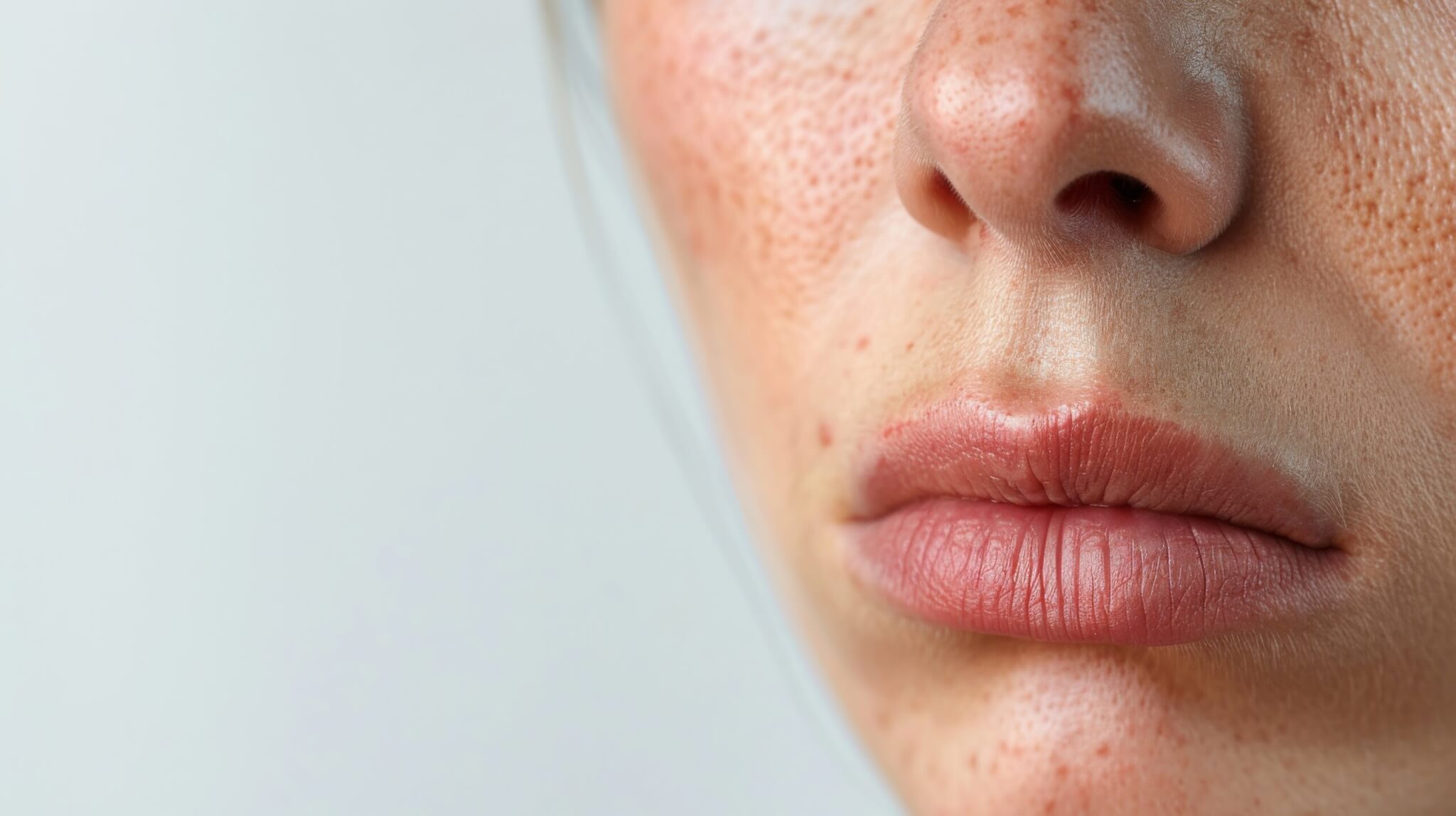Keeping skin clear and healthy should always be the goal, but for those who struggle with acne or regularly develop blackheads or whiteheads, this can be a struggle. According to Dr. Sitabkhan of U.S. Dermatology Partners Carrollton, “Working with a dermatologist to develop a skincare routine to address problem areas or chronic skin conditions like acne is the first step to managing blackheads and whiteheads, but it’s also important to understand the differences between these two types of blemishes, underlying causes, prevention steps, and how to get rid blackheads and whiteheads.” In this blog, Dr. Sitabkhan walks through all of that and more.
What Are Blackheads and Whiteheads?
Both blackheads and whiteheads are a form of acne. These blemishes may develop as part of an acne breakout or on their own. Blackheads, also called open comedones, are dark, flat bumps on the surface of the skin. In most cases, blackheads are not painful or inflamed. They typically occur when the skin produces oil that gets trapped inside the pore by dirt, grime, and dead skin cells. This creates the blackhead, but it also leads to dryness on the surrounding skin since the natural oils are unable to be secreted. Whiteheads, closed comedones, occur when pores become clogged, and they are covered with a thin layer of skin cells.
Common Causes of Blackheads and Whiteheads
Blackheads, whiteheads, and other blemishes are caused by excess oil production, failure to shed dead skin cells, dirt and grime buildup on skin, and bacteria. This buildup on the surface of skin can make its way into the pores, causing them to become clogged and leading to the formation of a blackhead or whitehead. In addition to these basic causes of pimple formation, there are also some lifestyle and genetic factors that increase the risk or trigger the formation of blemishes, including hormonal imbalance, stress, diet, and taking certain medications.
Effective Home Remedies for Blackhead and Whitehead Removal
Dr. Sitabkhan does not usually recommend attempting to remove blemishes at home, saying, “Most at-home tricks for removing blackheads or whiteheads are either unsafe, uncomfortable, ineffective, or all three. It’s almost always best to rely on dermatologist-developed and recommended skincare products or professional treatments. However, there are some DIY skincare ‘hacks’ that help with breakouts. For example, tea tree oil is a natural antibacterial. A small amount applied to the skin in areas affected by the breakout helps clear up blackheads and whiteheads. Placing a damp green tea bag on a blemish can reduce oil production as well as calm skin to promote healing.”
Essential Skincare Practices for Preventing Blackheads and Whiteheads
When it comes to preventing blackheads and whiteheads, Dr. Sitabkhan recommends, “Developing and maintaining a consistent skincare routine is the most important thing you can do to prevent the development of blackheads and whiteheads. Specifically, keeping skin clean, hydrated, and protected from sun damage is essential for managing blemishes.” Below, Dr. Sitabkhan shares additional tips to prevent blackheads and whiteheads:
- Change your cosmetics routine – you don’t need to skip makeup altogether, but you should apply products sparingly and select noncomedogenic cosmetics.
- Avoid unnecessary touching – the oils and bacteria on our hands can be transferred to skin, leading to clogged pores, inflammation, and infection.
- Keep skin clean – use a gentle cleanser in the morning, evening, and whenever skin is dirty to reduce risk for buildup clogging pores.
- Stay hydrated – it may seem like oily skin doesn’t need moisturizer, but when we don’t provide the skin adequate hydration, it continues to produce natural oils, leading to increased oiliness.
Professional Treatments: When to Seek Help
While at-home skincare products and the right daily routine make all the difference in preventing and treating blackheads and whiteheads, there are situations where a dermatologist may recommend professional treatments to complement at-home care. Some frequently recommended dermatologic treatment options for whiteheads and blackheads include:
- Extractions – for those who have numerous blackheads or whiteheads, a dermatologist may recommend an extraction. It can be tempting to pop pimples at home, but this increases the risk of scarring, inflammation, and infection. Professional extractions are a safe and effective option for whitehead and blackhead removal.
- Retinoids – over-the-counter retinols promote skin cell turnover to prevent clogged pores and improve the appearance and texture of the skin. If you don’t achieve the blemish-clearing results you want with a retinol, a stronger, prescription-strength topical retinoid may be recommended.
- Isotretinoin – your dermatologist may also recommend oral Isotretinoin. This medication is derived from vitamin A just like retinoids and retinols. Isotretinoin provides the same cell turnover and skin health benefits associated with topical retinol and retinoids, but it works from the inside out. In most cases, isotretinoin is only recommended for severe acne flare-ups.
- Oral antibiotics – these medications may be taken to reduce bacteria that can cause inflammation with clogged pores and worsen blackheads or whiteheads.
- Skin resurfacing – there are numerous ways to achieve this treatment, including chemical peels, microdermabrasion, laser therapy. The overall goal is to remove the outer layer of skin, open pores, and reveal healthier, new skin below. This clears up acne breakouts as well as reduces the risk for future breakouts.
Top Products for Blackhead and Whitehead Removal
According to Dr. Sitabkhan, “Your dermatologist will help you create a skincare routine that reduces blackheads and whiteheads and clears them up more quickly. While every skincare routine is unique to the individual, there are some products dermatologists often recommend for clearing up blackheads and whiteheads. You can learn more about some of my most recommended products below.”
- Epionce Purifying Spot Gel – penetrates pores to clear up blackheads or whiteheads and reduce oiliness without drying or irritating skin.
- SkinCeuticals Clarifying Clay Masque – this skin mask is uniquely formulated with hydroxy acids to gently exfoliate skin while natural clay decongests pores. Finally, aloe and chamomile calm and hydrate skin.
- ZO Skin Health Complexion Renewal Pads – step away from those blemish-fighting pads you may have used as a teenager and invest in the grownup version. These acne-fighting pads are non-drying, but they still deliver powerful pore cleansing and break down oil and grime to clear up blackheads and whiteheads.
- MD Skin Essentials Acne Kit – jumpstart your blemish-fighting skincare regimen with this kit that includes all the essentials you need: cleanser, toner, spot treatment, and retinol. Add a moisturizer in the morning and evening and sunscreen during the day, and you’ve got your whole skincare routine covered!
Get Started Working with a Professional
While there are some effective at-home treatments and skincare products to clear up blackheads and whiteheads, your dermatologist is the expert who can help you find the best options for preventing and treating pimples of all kinds. If you’re interested in learning more about how best to manage pimples, don’t hesitate to reach out to the team at U.S. Dermatology Partners, using our simple online scheduling request. Once one of our local dermatology team members receives your request, we’ll reach out to finalize the details of your upcoming visit.
Find a location near me
or


